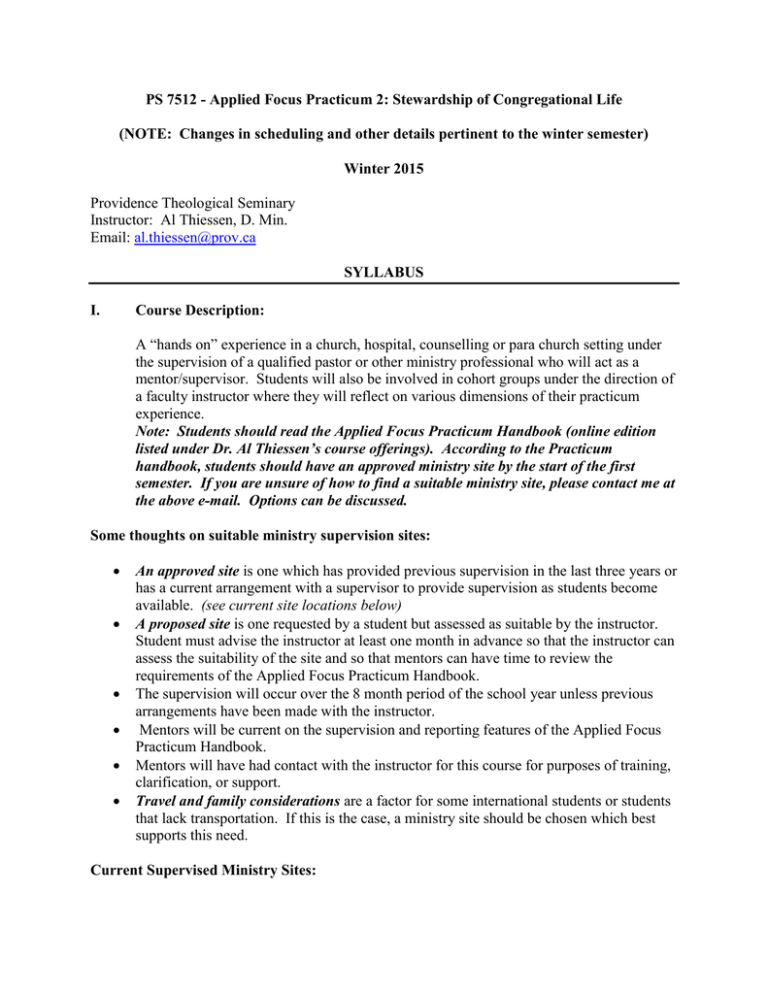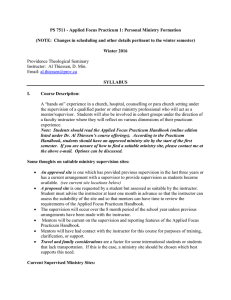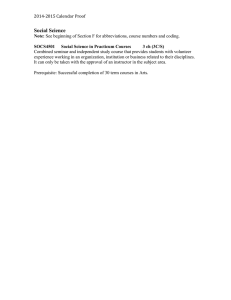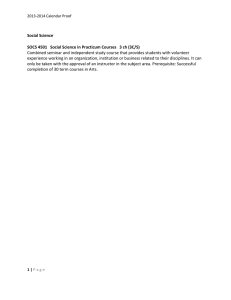PS 7512 - Applied Focus Practicum 2: Stewardship of
advertisement

PS 7512 - Applied Focus Practicum 2: Stewardship of Congregational Life (NOTE: Changes in scheduling and other details pertinent to the winter semester) Winter 2015 Providence Theological Seminary Instructor: Al Thiessen, D. Min. Email: al.thiessen@prov.ca SYLLABUS I. Course Description: A “hands on” experience in a church, hospital, counselling or para church setting under the supervision of a qualified pastor or other ministry professional who will act as a mentor/supervisor. Students will also be involved in cohort groups under the direction of a faculty instructor where they will reflect on various dimensions of their practicum experience. Note: Students should read the Applied Focus Practicum Handbook (online edition listed under Dr. Al Thiessen’s course offerings). According to the Practicum handbook, students should have an approved ministry site by the start of the first semester. If you are unsure of how to find a suitable ministry site, please contact me at the above e-mail. Options can be discussed. Some thoughts on suitable ministry supervision sites: An approved site is one which has provided previous supervision in the last three years or has a current arrangement with a supervisor to provide supervision as students become available. (see current site locations below) A proposed site is one requested by a student but assessed as suitable by the instructor. Student must advise the instructor at least one month in advance so that the instructor can assess the suitability of the site and so that mentors can have time to review the requirements of the Applied Focus Practicum Handbook. The supervision will occur over the 8 month period of the school year unless previous arrangements have been made with the instructor. Mentors will be current on the supervision and reporting features of the Applied Focus Practicum Handbook. Mentors will have had contact with the instructor for this course for purposes of training, clarification, or support. Travel and family considerations are a factor for some international students or students that lack transportation. If this is the case, a ministry site should be chosen which best supports this need. Current Supervised Ministry Sites: Niverville and St. Pierre: Elim Mennonite Church Maranatha Good News Center St. Pierre Fellowship In Steinbach: Emmanuel Evangelical Free Church Bethesda Place: Larry Hirst (Chaplain) check with instructor In Winnipeg: Willowlake Baptist Faith Covenant Church Soul Sanctuary Fort Gary Evangelical Mennonite Church II. Objectives: 1. The student will enter into practical ministry experiences consistent with their field of service and be supervised by a ministry mentor. 2. Students will demonstrate the ability to analyze and reflect on the issues and opportunities specified in their Applied Focus Practicum Handbook and in the course work specified in this syllabus. 3. Students will demonstrate a growing awareness of their call to ministry, strongest and weakest skills, emotional and spiritual maturity, gifts and aptitude, and demonstrate how they are responding to these features in their practicums. The reporting structure will help in this regard. 4. Students will reflect on various aspects of ministry which may not be encountered in their practicums. These may be issues raised by the student or the instructor. III. Course Requirements: 1. Contribute to the discussions in the cohort group and be regular in attendance (No more than two unexcused absences will be permitted, except for students doing distance practicums with approved alternate arrangements.) 2. Read and be familiar with the Applied Focus Practicum Handbook. This will explain the cohort structure and guidelines for students and mentors. 3. Submit reports to the faculty instructor as required, according to the timetable outlined in this syllabus. (All reports to be submitted can be found in the Applied Focus Practicum Handbook. These include report forms for both students and mentors….see the appendix.) Self –assessments, narratives, case studies of ministry situations, and feedback from supervisor evaluations will be used as reflective discussions in the cohort groups. Supervisor evaluations may be submitted online since supervisors are not in the colloquia and are often constrained by time and distance. 4. Read the textbook Diana R. Garland. Family Ministry: A Comprehensive Guide. 2nd ed. Downers Grove, IL: IVP Academic. 2012 This text will provide some of the content for discussion in the cohort groups, students are asked to make notes (marginal or otherwise) on helpful dimensions of each chapter. These notes will be helpful for recall when the book will be discussed later in the semester. Note: This text is from an American perspective, but most of the content will also have application to Canadian congregations and its scope will provide a broad range of ideas for church leaders. Since much congregational administration and development must take the family into account, this book will supply some of the conceptual and practical thinking necessary to structure family based programs and initiatives. IV. Cohort Dates: Wednesdays 8:30-11:05 - ***BEGINNING JAN. 28*** Jan. 28 – First Case Study due, First Narrative due (due on Jan. 26) Feb. 11- First Self -Assessment Due, First Verbatim due (due on Feb. 9) Feb. 25 - First Mentor Evaluation due (due on Feb. 23) March 18 - Second Case Study Due, Second Narrative due (due on Mar. 16) April 1 - Second Verbatim, Final Self-Assessment (due on Mar. 30) April 8 – Practicum 1 and 2 together: Final Mentor Evaluations due, Reading of Text Completed. Due April 8th. V. Grading Cohort group participation ……………………………………………..30% All reports submitted ……………………………………………………40% (2 Self-Assessments, 2 Ministry Narratives, 2 mentor Evaluations) 2 case studies and 2 verbatims submitted…………………………………………………………………..20% Reading of text…...……………………………………………………….10% VI. Required Reading Diana R. Garland. Family Ministry: A Comprehensive Guide. 2nd ed. Downers Grove, IL: IVP Academic. 2012 VII. Recommended Reading: Books will be recommended over the course of the semester. Students should also be prepared to recommend books from their own reading.



